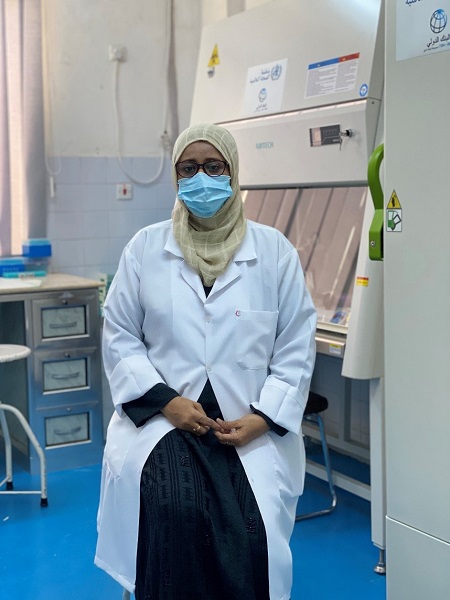“We had zero testing capacity, no one was trained, many health care workers neglected their role due to fear of COVID-19, but now with the support of WHO and the World Bank, all of us are trained and provided with lab equipment and supplies to help us minimize the spread of COVID-19 and revitalize Yemen’s destroyed health infrastructure,” Dr Mayada Gaafer, Deputy Head of Molecular Biology Laboratory, Central Public Health Laboratory, Aden

ADEN, 2 February 2022 – Dr Mayada is one of the first frontline health workers confronting the national laboratory response to the COVID-19 pandemic in Yemen. Despite a national shortage of health workers due to the fear and stigma surrounding COVID-19, Dr Mayada, unshaken, was one of the only laboratory workers at the central public health laboratory at Al-Jumhuriah Hospital, Aden.
The conflict in Yemen has had a catastrophic effect on the weak and struggling health system in the country. The rise of COVID-19 cases put an additional enormous strain on Yemen's public health system, putting the lives of millions at risk, as only half of the nation's health facilities are currently functioning.
The national laboratory at Al-Jumhuriah Hospital was looted and abandoned during the conflict, limiting the national testing capacity. Dr Mayada vividly remembers, "After the war, the lab was isolated, and in ruins, but now there is a glimmer of hope, and we started from zero".
To prevent a total collapse of Yemen's health system, WHO's Yemen COVID-19 Response Project, in partnership with the World Bank’s International Development Association, has supported the response of central public health laboratories to the COVID-19 pandemic. With this support, the laboratory located within Al-Jumhuriah Hospital in Aden is now one of the 15 functioning laboratories and hospital laboratories providing testing for COVID-19 in Yemen.
The project provided laboratory equipment for diagnostic testing, including polymerase chain reaction (PCR) machines, PCR diagnostic kits for COVID-19, laboratory supplies, tubes, pipette tips, nasopharyngeal swabs, and ribonucleic acid (RNA) extraction kits all of which are required to perform testing for COVID-19. In addition, the project facilitated the training for 75 health staff in all 6 central public health laboratories in Sana'a, Aden, Mukalla, Taiz, Sayoun and Hodeida on the technical procedures required to provide quality assured laboratory tests for COVID-19.
Through the generous support of the World Bank’s International Development Association, WHO's Yemen COVID-19 Response Project allows public health laboratories to take preventive measures to combat the widespread of COVID-19 cases. The laboratory support provided has increased diagnostic capabilities of the Ministry of Public Health and Population in Yemen and data generated from the laboratories enables new cases to be monitored to implement health measures to reduce further spread of the infection.
Dr Mayada says, “Without WHO and the World Bank, we wouldn't have been able to detect the COVID-19 virus in Yemen, I spent countless nights away from my family to bring the laboratory back to life."
The Ministry of Public Health and Population, alongside healt hcare professionals, have access to data that will assist them in managing and preventing the spread of COVID-19. They will now be able to implement preventive measures and protocols to secure the health and safety of the Yemeni population.


